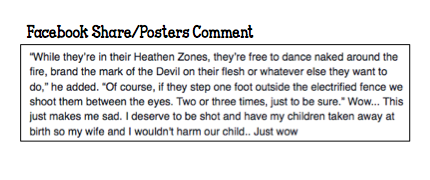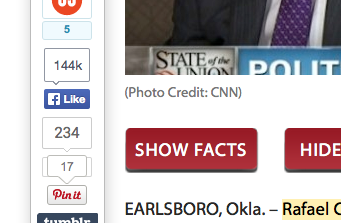The Merrium-Webster Dictionary defines gullible as “easily fooled or cheated; quick to believe something that is not true. Unfortunately, with such easy access to information on the internet in our schools, many students are becoming more and more gullible every day. Sadly, this is not only affecting academic success and student intelligence, but is fueling the divide between individuals, separating our society thanks to the rapid spread of misinformation.

I recently saw an article link in my Facebook feed, and the poster’s comment included a quote that was very disturbing. The words actually reminded me of many accounts from the German Holocaust and the treatment of the Jews by Nazi Germany. I immediately clicked to read more. The article discussed viewpoints, and included quotes from a presidential candidate’s father, and suggested that some Americans (a specific population) should be placed in camps and shot if they tried to leave. An image was strategically placed at the top of the page (with credits to CNN), and the entire site could easily be mistaken for a “reputable” news outlet.

EXCEPT…
This is the difference between students of my generation, and those of our current. Having learned many years ago that you never gather all of your facts from one book, magazine, or journal (yes, no Internet back then), I always question any source for its validity. I also learned the old adage, “If something is too good (or bad) to be true, it probably is.” Translate that advice to fit modern times, and we can say that if something is too extreme, it is probably created only to cause a stir.
And that’s exactly what satire websites are doing. They are deliberately creating misinformation, not to spur thought or conversation, but to mislead this younger (and some older) generation into anger over the words on the page. This only deepens the divides between us.
Think about it. How often do you see a post claiming something extreme has been said or done by atheists? Christians? Muslims? Or politically? Democrats? Republicans? What about culturally? Asians? Europeans?
Do you stop and think (with anger building in your throat), “Wow, I can’t believe they’d say/do that!” Or do you question the validity of the report in the first place? Do you investigate?
According to the American Psychological Association, “Searching the Internet for information may make people feel smarter than they actually are…”
“The Internet is such a powerful environment, where you can enter any
question, and you basically have access to the world’s knowledge at your
fingertips,” said lead researcher Matthew Fisher, a fourth-year
doctoral candidate in psychology at Yale University. “It becomes easier
to confuse your own knowledge with this external source. When people are
truly on their own, they may be wildly inaccurate about how much they
know and how dependent they are on the Internet.”
See the full article here: http://www.apa.org/news/press/releases/2015/03/internet-knowledge.aspx
And here’s the scariest part for me… Our youngest students are learning to depend on the Internet for their information. They are being introduced to it before preschool, and are taught that it is a reliable source. They seldom visit a library or write up index cards where they can layout and compare the varying viewpoints on any topic. Even worse, they do not care (or are not taught to care) about the difference. An answer is an answer, question done!
Oh… that article that prompted this post… It was a satire site with little tabs at the very top (hidden under the picture for only the really curious eye to find) offering the option to “Show Facts” or “Hide Facts” as you read. Of course, the facts are hidden to start, but clicking that tab highlights the true words they used for their creative writing that followed. And it worked. The post I saw on Facebook collected thousands of likes, was shared by hundreds, and had too many hate-filled comments to count.

And yet, when I teach about the Holocaust and the persecution of groups in Germany, I am always asked, “How could people fall for all that?” Hmmm… I wonder.
Here’s my Holocaust Unit that may help your students learn to question… everything!
Happy Thinking!